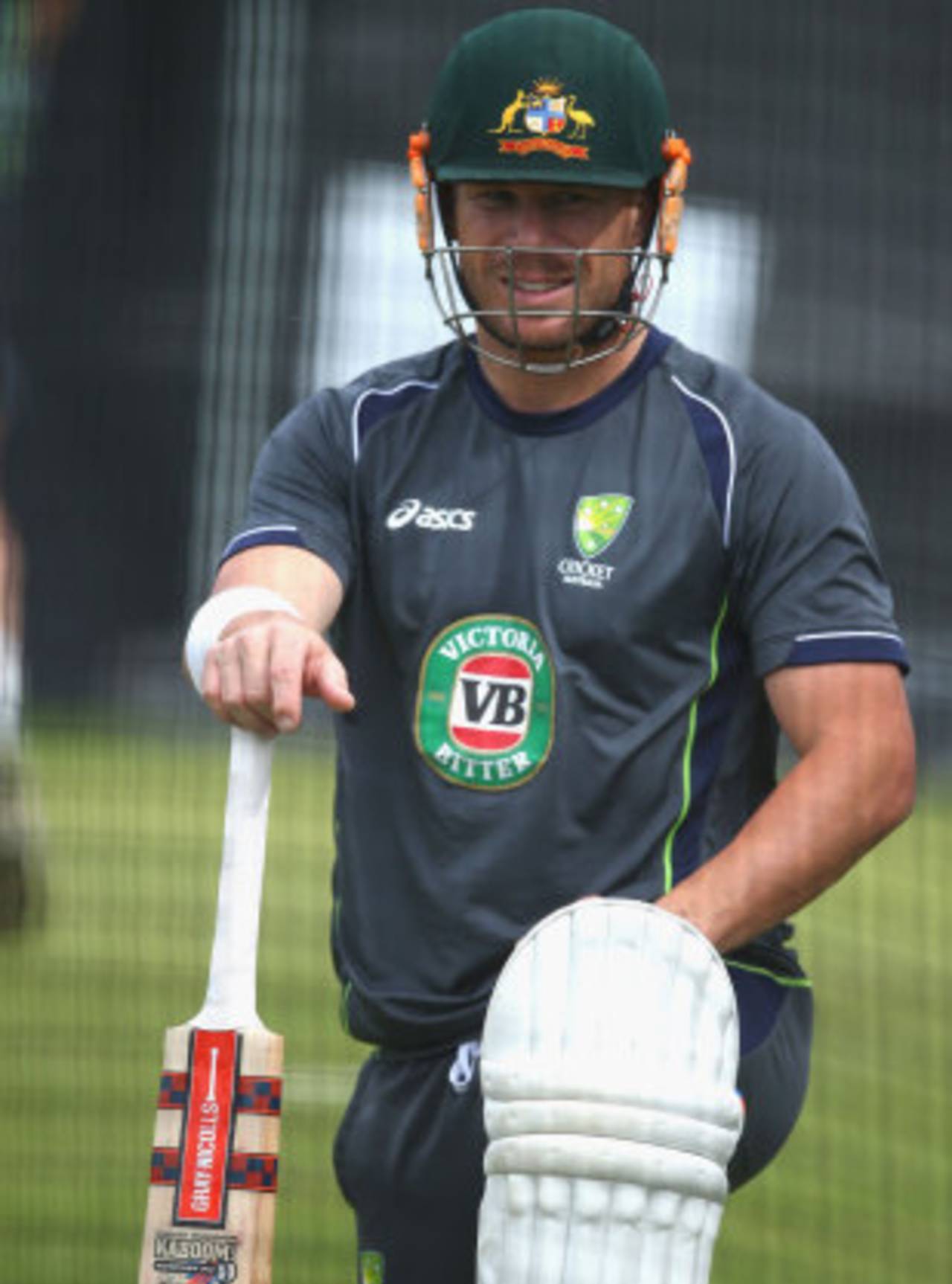Australia in danger of creating history
At an iconic venue that has seen some remarkable feats, Australia could rewrite the record books this week but not how they would have liked
Brydon Coverdale
Jul 30, 2013, 6:09 PM

David Warner must play at Old Trafford • Getty Images
Old Trafford is not a place of cricketing miracles, for a miracle implies divine intervention. If Australia's plans for this week are based on divine intervention, they're in bigger trouble than anyone realised.
But Old Trafford is the venue of some extraordinary Ashes achievements, from Jim Laker's 19-wicket Test to Shane Warne's ball of the century, from Victor Trumper's hundred before lunch on the first day in 1902 to Ian Botham's tour de force in 1981. As Brett Lee and Glenn McGrath showed by clinging on in 2005, even its draws can astonish.
In short, strange things happen at Old Trafford. They might happen due to exceptional human talent and audacity, as in the case of Warne or Botham or Trumper. It might be the combination of circumstance and the seizing of an opportunity, as with Laker on a surface that was made for him. Or they may happen because of sheer bloody-mindedness and fight, as in the 2005 draw. The pitch might have rotated 90 degrees since then but Old Trafford still feels like a history-making venue.
Unfortunately for Australia, the history that appears most likely to be created over the next week is the equalling of a 125-year-old record, for not since 1888 have Australia lost seven consecutive Tests. The Lord's defeat was their sixth in a row, stretching back to Chennai in February, which was also the last Test in which an Australian scored a century. That their sequence of losses has coincided with such a triple-figure drought is no coincidence.
If rectifying their batting issues was a simple matter, Michael Clarke and Darren Lehmann would have sorted things out already. Even against a modest attack at Hove, the Australian batsmen for the most part were unable to convert their encouraging starts into hundreds. To that end, David Warner has to play at Old Trafford, after mauling a South Africa A attack featuring Kyle Abbott and Marchant de Lange during an innings of 193 last week.
Australia do not have a Warne, nor a Botham, nor an artist like Trumper. But a fighting draw is of no use; they must find a match-winner somewhere in their squad. At 2-0 down, they must be prepared to take risks, and Warner could hardly be more of a risk-taker if his hobby was skydiving. The Australians need to push him out of the plane and see if his parachute opens. If it doesn't, they are no worse off for his crash landing than they are now. But if he gets it right, Warner will force the pressure back on England.
That is not to say the team as a whole should be reckless. The dry pitch already sported some bare patches two days before the Test, and a few cracks. It will spin as the match wears on, if not from the very start. Warner can be given licence but other batsmen must anchor the innings, Chris Rogers and Michael Clarke among them. They are the kind of men who naturally accumulate runs if they bat time; Clarke has done it at Test level and Rogers at length on the first-class scene.
Nathan Lyon found some loop and dip against Sussex and his experience at Test level means he must play in such an important match.
Should England include Graeme Swann and Monty Panesar, the Australians could do worse than looking to Laker's match for some hints. The opener Colin McDonald top scored in both innings in that game. His second-innings 89 took five and a half hours. Of course, the conditions were extreme - McDonald described the pitch as like Bondi Beach in the first innings and a mud-heap in the second, after heavy rain - and Australia's batsmen need not replicate his scoring rate. But they can take note of his advice on handling challenging spin.
"It was necessary to apply all your concentration," McDonald said of batting in that Test. "My technique was based around two things. One was side-on play, and secondly, any ball that was pitched up you used your feet to get to. You had to largely play back against fairly prodigious offspin."
Use your feet when the ball is tossed up, play back to the quicker balls, concentrate intensely - it remains sound counsel. Whether Australia's current batsmen have the required techniques and patience is another issue. As is whether they have the spinners to exploit the turning conditions. Nathan Lyon has bowled well in the nets at Old Trafford and found some loop and dip as the Sussex game wore on, and his experience at Test level means he must play in such an important match.
At 19, Ashton Agar has immense potential, but he is still learning. Agar's batting at Trent Bridge was as memorable as some of Old Trafford's finest moments but he is primarily a bowler, and his work with the ball needs improvement. Even on a spinning pitch, the selectors should seriously consider Jackson Bird ahead of Agar, after Bird found swing and seam at Hove and hit such accurate lines that the pressure naturally built on the batsmen.
Whoever is chosen can create their own individual piece of Old Trafford Ashes history. Otherwise - and barring divine intervention - the Manchester Test of 2013 may go down in the annals as Australia's record-equalling seventh straight defeat. Either way, it will be worth watching.
Brydon Coverdale is an assistant editor at ESPNcricinfo. He tweets here